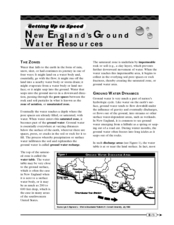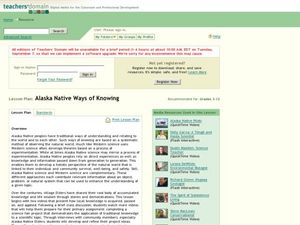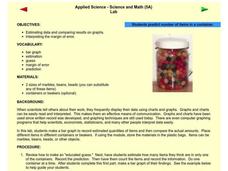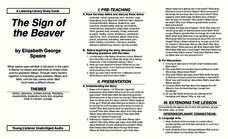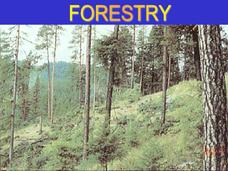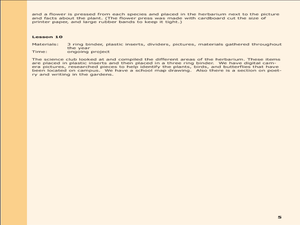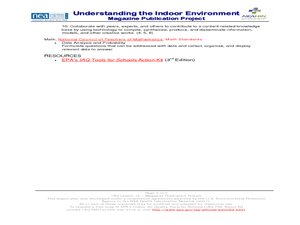Environmental Protection Agency (EPA)
New England's Ground Water Resources
Learn all about where ground water is stored, how it moves, and how it is accessed in a detailed and thorough 10-page reading. Whether supplementing reading for an existing environmental or earth science course or providing background...
Curated OER
X-Ray Eyes
Learners observe Australian X-ray paintings for information and to understand the art techniques used. Then they imagine and draw the inner organs of an animal. Students also research the anatomy of the animal to analyze the accuracy of...
Curated OER
Alaska Native Ways of Knowing
Pupils watch a video on the Alaskan native ways. They examine how knowledge was passed down from elders and how the Alaskans lived with harmony in nature. Learners then prepare and present a classroom science fair project based on their...
Curated OER
Roller Coasters
Twisting and turning through the sky, roller coasters are popular attractions at amusement parks around the world, but how exactly do they work? Explore the physics behind these thrilling rides with an engineering design activity....
Curated OER
Plants: Report Planner
Introduce your young learners to the basic research project. They explore plants using a three-page note-taking guide. On the first page, they write down things they would like to know about the topic and where they might look to find...
Curated OER
Conserving Water through Art!
Students study water conservation. In this water conservation lesson, students investigate the scarcity of water and determine reasons for conserving water. Students estimate how much water they use in one day and identify ways to...
California Academy of Science
Poetic Reflections
Poetry is a wonderful way to explore language, express topical understanding, and incite creative thinking. After a trip to the local natural history museum (or zoo), learners write an acrostic or a cinquain poem describing one of their...
Alabama Wildlife Federation
Leaf Creatures
The structure of a leaf reveals a lot about the plant it comes from. Young scholars collect and prepare leaves for comparison. After pressing the leaves, they identify the different parts and then use the leaves to complete an art project.
Curated OER
Classifying Plants and Insects
Art and science come together in a lesson based on Flower Still Life by Ambrosius Bosschaert the Elder. Learners classify plants and insects in the painting by color, leaf shape, size, reproduction, and season of bloom.
Curated OER
Applied Science - Science and Math Lab
Students make a prediction. In this applied science instructional activity, students guess the number of items in a jar. Students create a bar graph to show the predictions and the actual amounts.
Listening Library
The Sign of the Beaver
Extend a class reading of the novel The Sign of the Beaver across all subject areas with this literature unit guide. From basic discussion questions and writing prompts, to a research project about tracking animals, this resource offers...
Curated OER
Forestry
When you are exploring pollution or human impact on the environment with your class, this PowerPoint will serve as a support. The first half focuses on the effects of the logging industry, creating roadways, and wildfires. The second...
Curated OER
Project Ahupua`a: Map Construction
Fourth graders construct a relief map of the Big Island of Hawaii. They work in groups to conduct research, design and construct the map. Students use clay, gessoed boards and reference maps in their projects.
DiscoverE
Waterproofing the Roof
Can your pupils build a roof that stands the test of time? Use an insightful engineering design project to highlight both materials science and architecture. Scholars either team up or work as individuals to design, create, and test a...
Baylor College
What Is the Water Cycle?
Small groups place sand and ice in a covered box, place the box in the sunlight, then observe as evaporation, condensation, and precipitation occur. These models serve as miniature water cycles and demonstrations of the three phases of...
Baylor College
What Is a One Part Per Million Solution?
Water may appear to be crystal clear, but there could be dissolved substances present. Lab groups make a one-part-per-million of a food coloring solution to demonstrate this concept. As part of an outstanding unit about water, this...
Baylor College
Heart and Lungs
With a partner, youngsters measure their pulse and breathing rates, both at rest and after running in place for a minute. While this activity is not novel, the lesson plan includes a large-scale classroom graphing activity and other...
Baylor College
Dust Catchers
In class, your emerging environmentalists construct dust catchers. They take them home for a week or two, and then bring them back into class to examine under a magnifier. From this activity, they learn what makes up dust and that...
Baylor College
Moving Air
In lab groups, young scientists place aluminum cans with a bubble-solution cap into different temperatures of water to see what size of bubble dome forms. As part of an atmosphere unit in preparation for learning about convection...
California Academy of Science
Kinesthetic Astronomy: Moon Phases
We are the world! Each of your class members models Earth and holds a styrofoam ball to see its phases. Thorough teacher background information and a detailed lesson plan will make this a cinch to teach. If you do not want to purchase...
Curated OER
Nature Oriented Kindness Projects
Students complete various nature activities where they work together to create a butterfly garden, plant flowers, learn about nature survival, and more. In this nature lesson plan, students work together in groups and display kindness...
Curated OER
Museums in the Classroom Pumpkin Project
Students identify the 5 stages in the life cycle of a pumpkin. They create a model showing the correct order of pumpkin life stages. They explain a pumpkin's life cycle to a partner, using their model.
Curated OER
Indoor Environment: A Magazine Publication Project
Students demonstrate knowledge of Indoor Air Quality by creating a class magazine. A link to order a free Action Kit from the U.S. Environmental Protection Agency is provided so teachers can build background knowledge. Performance...
Curated OER
The Dirty Water Project
Students investigate different methods (aeration and filtering) for removing pollutants from water. They design and build their own water filters. Students identify the pollutants in a water sample using sight and smell, explore what...
Other popular searches
- 4th Grade Science Project
- Physical Science Projects
- Science Project on Pulleys
- Science Project Volcano
- Science Project Gravity
- Science Project Ideas
- Forensic Science Project
- Science Fair Project Ideas
- Rock Science Project
- Science Project Food
- Science Project Terrarium
- Science Fair Project Data


